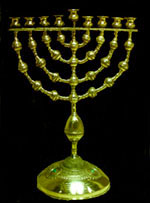| Those
who studied the mystical teachings in the Kabbalah and experienced
the messianic movement of Shabbtai Zvi. |
 |
|
Menorah
|
Jews constituted
the main non-Christian minority in Europe. Hostility toward Jews was fueled
by the idea that they were responsible for the death of Christ. Luther
spoke against this idea and the violence that it generated, insisting
that the story of Christ's death is a summons for all people to repent
of sin. During the Reformation many hoped that the Jews would convert
to Christianity. When this did not happen, however, Luther leveled harsh
critiques against the Jews for their unbelief. In the wake of the religious
conflicts that followed the Reformation, the philosopher Baruch Spinoza
(1632-77), who was of Jewish origin, wrote a plea for toleration of variety
in religious practice. Mystical trends in Judaism became prominent in
the sixteenth and seventeenth centuries. Teachings known as "Kabbalah,"
which offered mystical insights into the will of God, circulated widely.
Hopes arose that the messianic age might be near. A figure named Shabbtai
Zvi was acclaimed as the messiah in 1665, generating a wave of support.
Although he soon converted to Islam, the religious renewal continued,
assuming new forms in Judaism
of the modern period.
|